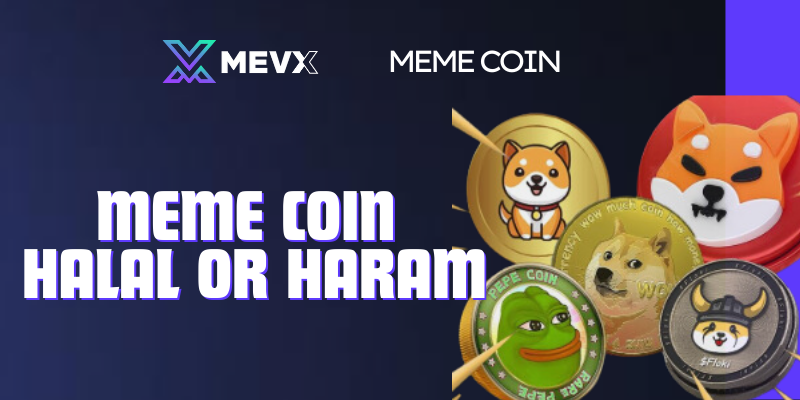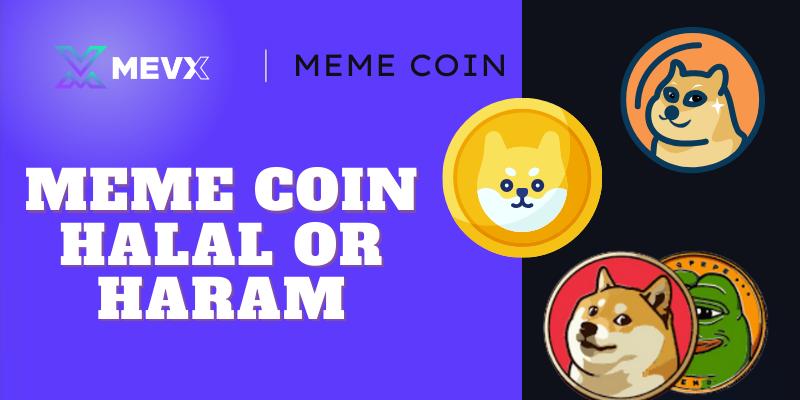With the rise of meme coins like Dogecoin and Shiba Inu, many people are now asking whether investing in these coins aligns with Islamic financial principles. In this article, we will answer the question: Meme Coin Halal or Haram from the perspective of Islamic finance.
Meme Coin Halal or Haram?
When asking “are memecoins haram?”, the majority of Islamic scholars would likely answer yes. Most religious authorities believe that meme coins, with their highly speculative nature and lack of intrinsic value, are likely haram (forbidden) in Islamic finance. This conclusion stems primarily from their speculative characteristics, absence of real-world utility, and the unethical behaviors often associated with these digital assets.

Why are meme coins considered Haram?
To better understand why meme coins may be considered haram, we need to analyze them through two core Islamic finance principles: Maysir (gambling) and Gharar (excessive uncertainty).
1. Maysir (Gambling) and Speculation
In Islamic finance, Maysir refers to gambling, where profits are not based on solid foundations but rather on chance. Meme coins like Dogecoin and Shiba Inu are highly volatile and generally lack intrinsic value, relying mostly on market speculation and hype. Therefore, many argue that investing in meme coins resembles gambling, where the profits are not determined by real value but by unpredictable market movements.
2. Gharar (Excessive Uncertainty)
Gharar refers to excessive uncertainty or ambiguity in a contract or investment. In the case of meme coins, their extreme volatility and lack of tangible utility mean they carry a significant amount of risk and uncertainty. Investments with such high levels of uncertainty are not aligned with Islamic financial principles, as they fail to provide the clarity and security that are central to Shariah-compliant transactions.
3. Pump-and-Dump Schemes
Another issue with meme coins is their association with “pump-and-dump” schemes, where early investors inflate the price through speculation and hype, only to sell off their holdings once the price peaks, leaving later investors with losses. Such practices exploit others and are considered unethical in Islamic finance, making them haram due to their unfair nature and potential harm to others.
4. Lack of Intrinsic Value
Islamic finance principles dictate that investments should be based on assets with real, tangible value. Meme coins, however, lack real-world applications and are typically driven by internet memes or jokes. They do not offer any practical benefits or utility, which means they fail to meet the requirements for a halal investment in Islamic finance.

Scholarly Opinions on Meme Coins
Several prominent Islamic scholars have weighed in on the question of meme coin halal or haram:
- Mufti Taqi Usmani, a leading authority on Islamic finance, has emphasized that investments should be based on tangible, ethical value. He argues that speculative assets like meme coins, which lack real utility and value, do not align with Islamic principles.
- Sheikh Dr. Haitham al-Haddad warns that financial decisions involving extreme risk and volatility, such as meme coin investments, violate the ethical guidelines of Shariah.
- Mufti Faraz Adam advises Muslim investors to avoid high-risk investments like meme coins, recommending instead assets that provide clear societal benefits and have intrinsic value.
Should Muslim Investors Avoid Meme Coins?
Given the high failure rate of meme coins—reports suggest that up to 97% of meme coins fail – many scholars recommend that Muslim investors avoid them. Instead, they should focus on more stable cryptocurrencies with clear utility, such as Ethereum or Solana, which better align with Shariah principles and are less speculative.
In conclusion, when asking “are memecoins haram,” the overwhelming consensus among Islamic scholars is that they lean toward being haram due to their speculative nature, high risk, and lack of intrinsic value. For Muslim investors, the ethical approach is to avoid investments like meme coins and instead prioritize cryptocurrencies with practical use cases and stable value. This approach ensures that financial decisions align with both their financial goals and faith.
By choosing investments with real-world utility and minimizing exposure to speculation, Muslim investors can ensure their portfolios align with both their financial goals and Islamic values.
For more insightful updates on Meme Coin Halal or Haram and other finance-related topics, don’t forget to follow MevX Blog for future posts!
Share on Social Media:
